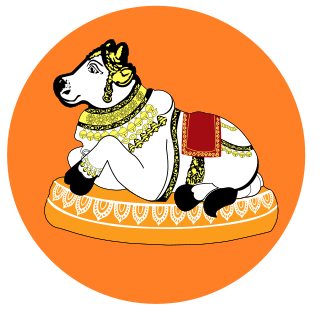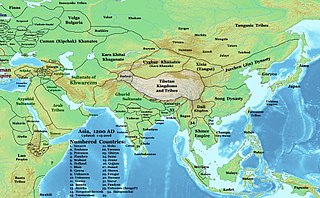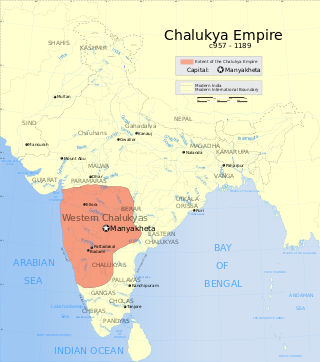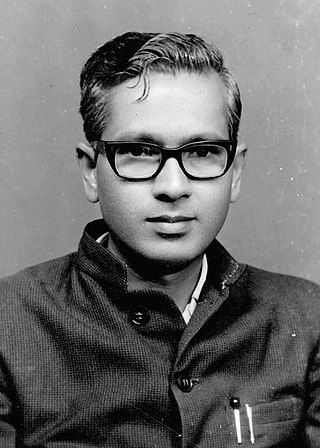
K. Satchidanandan is an Indian poet and critic, writing in Malayalam and English. A pioneer of modern poetry in Malayalam, a bilingual literary critic, playwright, editor, columnist and translator, he is the former editor of Indian Literature journal and the former secretary of Sahitya Akademi. He is also social advocate for secular anti-caste views, supporting causes like environment, human rights and free software and is a well known speaker on issues concerning contemporary Indian literature. He is the festival director of Kerala Literature Festival.
Indian poetry and Indian literature in general, has a long history dating back to Vedic times. They were written in various Indian languages such as Vedic Sanskrit, Classical Sanskrit, Ancient Meitei, Modern Meitei, Telugu, Tamil, Odia, Maithili, Kannada, Bengali, Assamese, Hindi, Marathi and Urdu among other prominent languages. Poetry in foreign languages such as English also has a strong influence on Indian poetry. The poetry reflects diverse spiritual traditions within India. In particular, many Indian poets have been inspired by mystical experiences. Poetry is the oldest form of literature and has a rich written and oral tradition.

Basava (1131–1167), also called Basavēśvara and Basavaṇṇa, was an Indian philosopher, poet, Lingayat social reformer in the Shiva-focused bhakti movement, and a Hindu Shaivite social reformer during the reign of the Kalyani Chalukya/Kalachuri dynasty. Basava was active during the rule of both dynasties but reached the peak of his influence during the rule of King Bijjala II in Karnataka, India.

Kannada literature is the corpus of written forms of the Kannada language, spoken mainly in the Indian state of Karnataka and written in the Kannada script.

Allamaprabhu was a 12th-century mystic-saint and Vachana poet of the Kannada language, propagating the unitary consciousness of Self and Shiva. Allamaprabhu is one of the celebrated poets and the patron saint of the Lingayata movement that reshaped medieval Karnataka society and popular Kannada literature. He is included among the "Trinity of Lingayathism", along with Basavanna, the founder of the movement, and Akka Mahadevi, the most prominent woman poet.

Anubhava Mantapa, established by Basavanna in the 12th century C.E., is a religious complex located in Tipranth, Basavakalyan, in the Bidar district of Karnataka. It is the first religious parliament in the world, whose name is literally translated as "experience pavilion", and was an academy of mystics, saints and philosophers of the lingayat faith in the 12th century. It was the source of essentially all religious and philosophical thought pertaining to the lingayat, and was presided over by the mystic Allama Prabhu, with numerous Sharanas from all over Karnataka and other parts of India participating.

Hoysala literature is the large body of literature in the Kannada and Sanskrit languages produced by the Hoysala Empire (1025–1343) in what is now southern India. The empire was established by Nripa Kama II, came into political prominence during the rule of King Vishnuvardhana (1108–1152), and declined gradually after its defeat by the Khalji dynasty invaders in 1311.

A large body of Western Chalukya literature in the Kannada language was produced during the reign of the Western Chalukya Empire in what is now southern India. This dynasty, which ruled most of the western Deccan in South India, is sometimes called the Kalyani Chalukya dynasty after its royal capital at Kalyani, and sometimes called the Later Chalukya dynasty for its theoretical relationship to the 6th-century Chalukya dynasty of Badami. For a brief period (1162–1183), the Kalachuris of Kalyani, a dynasty of kings who had earlier migrated to the Karnataka region from central India and served as vassals for several generations, exploited the growing weakness of their overlords and annexed the Kalyani. Around 1183, the last Chalukya scion, Someshvara IV, overthrew the Kalachuris to regain control of the royal city. But his efforts were in vain, as other prominent Chalukya vassals in the Deccan, the Hoysalas, the Kakatiyas and the Seunas destroyed the remnants of the Chalukya power.

Vachana sahitya is a form of rhythmic writing in Kannada that evolved in the 11th century and flourished in the 12th century, as a part of the Sharana movement. The word "vachanas" literally means "(that which is) said". These are readily intelligible prose texts. These writings are notable for their simplicity and directness, often addressing social issues and personal devotion. They were composed in Kannada by saints of the Lingayat faith, most notably Basavanna, Akka Mahadevi, and Allama Prabhu. Vachanas critique rituals and caste discrimination, advocating a form of worship centered on Shiva, envisioned as a universal god.

Chandrashekhara Basavanneppa Kambara is a prominent Indian poet, playwright, folklorist, film director in Kannada language and the founder-vice-chancellor of Kannada University in Hampi also president of the Sahitya Akademi, country's premier literary institution, after Vinayak Krishna Gokak (1983) and U.R. Ananthamurthy (1993). He is known for effective adaptation of the North Karnataka dialect of the Kannada language in his plays, and poems, in a similar style as in the works of D.R. Bendre.

Vijayanagara literature in Kannada is the body of literature composed in the Kannada language of South India during the ascendancy of the Vijayanagara Empire which lasted from the 14th through the 16th century. The Vijayanagara empire was established in 1336 by Harihara I and his brother Bukka Raya I. Although it lasted until 1664, its power declined after a major military defeat by the Shahi Sultanates in the battle of Talikota in 1565. The empire is named after its capital city Vijayanagara, whose ruins surround modern Hampi, now a World Heritage Site in Karnataka.
Harihara was a noted Kannada poet and writer in the 12th century. A native of Halebidu in modern Hassan district, he came from a family of accountants (Karnikas) and initially served in that capacity in the court of Hoysala King Narasimha I. Later, he moved to Hampi and authored many landmark classics. Among his important writings, the Girijakalyana written in champu metre is considered one of the enduring classics of Kannada language.

Chennaveera Kanavi was an Indian Kannada language poet and author. In a career spanning over seven decades he wrote over 25 anthologies and over 28 books across genres. He was considered one of the major poets and writers in the Kannada language and received the Sahitya Akademi Award for his poem "Jeeva Dhwani" in 1981. He was popularly known as "Samanvayada Kavi", "Chembelakina Kavi", and "Soujanyada Kavi".

Dr. D. R. Nagaraj was an Indian cultural critic, political commentator and an expert on medieval and modern Kannada poetry and Dalit movement who wrote in Kannada and English languages. He won Sahitya Akademi Award for his work Sahitya Kathana. He started out as a Marxist critic but renounced the Marxist framework that he had used in the book Amruta mattu Garuda as too reductionist and became a much more eclectic and complex thinker. He is among the few Indian thinkers to shed new light on Dalit and Bahujan politics. He regarded the Gandhi-Ambedkar debate on the issue of caste system and untouchability as the most important contemporary debate whose outcome would determine the fate of India in the 21st century.

Togere Venkatasubbasastry Venkatachala Sastry, commonly known as T. V. Venkatachala Shastry, is a Kannada-language writer, grammarian, critic, editor and lexicographer. He has authored in excess of 100 books, translations and has edited collections of essays, biographical sketches and felicitation volumes. Recipient of the Kannada Sahitya Akademi Award (honorary), Sastry is an authority on Kannada language grammar and its various facets ranging from the metre scale on which he has written extensively to the history of Kannada literature spanning two millennia.
Balaji Tangali Lalitha Naik is an Indian social activist, politician, writer, film actress who was the minister of Kannada, Culture, and Department of Women & Child Welfare of Karnataka. Naik has also served as an MLC (1986-1992) and MLA (1994-1999). She won the Karnataka Sahitya Academy Award in 1991. She is also known for leading important literary, social and language-rights movements such as Bandaya movement and Gokak agitation.

Chandrashekar Patil, popularly known as Champa, was an Indian poet, playwright and public intellectual writing in Kannada. Patil was a recipient of the Karnataka Sahitya Akademi Award for Poetry in 1989 and the Karnataka state government's Pampa Award in 2009. Patil had served as the president of the Kannada Sahitya Parishat, a Kannada language literary organization.
Lankappa Hanumanthaiah is an Indian poet, politician of the Indian National Congress and a member of the upper house of the Indian Parliament, the Rajya Sabha, from the state of Karnataka.

Venkataramaiah Seetharamaiah commonly known as Vee See, was a Kannada poet, writer, essayist, critic, editor and teacher who taught Kannada literature at University of Mysore between 1928 and 1955. He is a recipient of the Karnataka Sahitya Akademi Award (1973), Kendra Sahitya Akademi Award and an Honorary Doctorate from University of Mysore in 1976. He presided over the 36th Kannada Sahitya Sammelana at Kumta in 1954.

Abdul Rasheed is an Indian writer, poet, editor and translator from Karnataka. In 2004 he won Sahitya Akademi Golden Jubilee Award for lifetime achievement. He also a translator, blogger, columnist and radio personality.
















